The most dangerous animals in the world in 2025 are deadly animals that have taken the lives of many innocent people. Some animals mentioned below may surprise you as they are on this list of deadly animals and you will possibly wonder at the figures of human death they caused yearly.
This article explains in detail the reasons encountering these animals can be fatal plus the human death cause per year figures.
These are the top 17 world's most dangerous animals 2025 (deadliest), they are,
- Mosquito
- Tsetse fly
- Freshwater snail
- Venomous Snakes
- Tapeworm
- Dogs
- Assassin Bugs
- Scorpion
- Crocodiles
- Hippopotamus
- Elephants
- Lions
- Tiger
And four more of these deadly animals on earth you need to know. Check out the annual human death figures they cause and how they attack people, how you can protect yourself, and lots more.
Keep reading!
17. Shark
 |
| Image credit: Parker_West / Pixabay |
Annual human death cause: Around 11
Even though sharks rarely attack, they often ignore people in the water. In fact, there are lots of sharks people encounter in water than what people may think.
However, Sharks can be deadly because they are among the world's leading predators, bringing them on the list of the most dangerous animals in the world in 2025. Furthermore, human abilities in the water in comparison to those of sharks in their natural habitat are low.
Some shark species are aggressive, and even the least provocation might result in a severe response or attack. If you encounter them, never provoke them, because provoking could be fatal.
The great white, tiger and bull sharks make up the main unprovoked attacks on people where a species is not fully recognized.
Some scientists have speculated that juvenile great white sharks may assault humans to perfect their predatory abilities; similar to how young lions would try any prey they can get their hands on.
Irrespective of the motives for attacking people, the dangers are relatively low. Shark attacks occur at a rate of 0.5 per million persons in Australia, but less than 0.2 per million in the United States.
16. Box Jellyfish
Annual human death cause: 50 to 100
People hardly know that this small fragile looking animal, box jellyfish is deadly, it is the most venomous animal, other animals are coming behind. This animal is capable of killing a person within 2 minutes, if its tentacles touch the person.
Figures of people that died annually from encountring this animal might still be low as there are incidents that may not be reported. This animal can be found in Indo-pacific or tropical Australia, so if you visit this place, you need to be extraordinarily careful.
There are about 51 species of box jellyfish. However, Chironex fleckeri (Australian box jellyfish) is the deadliest among the species. Its venom is 100 times piosonous than cobra, according to Novelist Robert Drewe.
Box jellyfish are dangerous, even though not all of this species can kill, but they all causes painful sting. Their sizes varies, from the size of basketball to the size of your thumb.
Depending on the species, they can have 15 to 60 tentacles and each tentacles can be 6 to 10 inches long that are lethal dose of venom. On each of their tentacles are cells containing billions of nematocysts.
This cells on their tentancles fires more than 200,000 nematocysts per sting. No wonder it hurt their victim so much that it can lead to death in minutes bringing them among The most.dangerous animals in the world in 2025.
To survive box jellyfish sting, it is highly recommended that you to get out of water immediately, pick off the tentacles if they attach to your body with glove or similar material, do not rob the sting area and then seek medical attention immediately, you can read more about that here.
15. Deer
 |
| Image credit: Nikon D3200 / Pixabay |
Annual human death cause: 130 to 200
You may be surprised that deer is on this list. It is the deadliest animal in the US and one of the world's most dangerous in 2025 as well.
As shown in the LCB data, deer are much more likely to cause deaths than bears, sharks, and alligators. Accidents, not ferocious attacks from deer, are the most common cause of deer-related deaths.
The deer's native habitat is diminishing as a result of fast urban expansion, forcing them to share more space with humans, where they frequently wander into moving traffic and cause automobile crashes.
Deer-related crashes
are becoming more common across the world especially in the United States, prompting some programs to be
organized.
14. African Buffalo
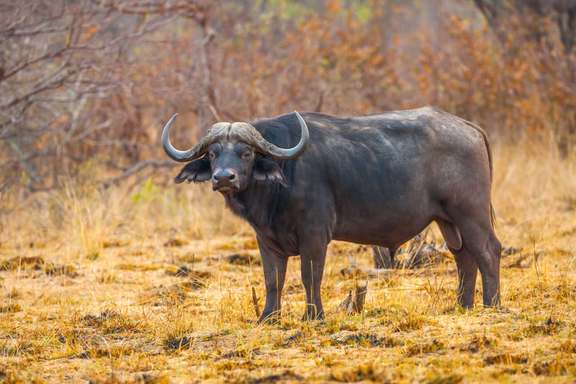 |
| Image credit: Chris Steger / Unsplash |
Annual human death caused: 200
African buffaloes have been recorded to killed more hunters, it is among other leading wildlife animals in Africa that kill hunters. If these animals are injured, they become aggressive and furious. They would seek vengeance on the hunter and will even recall the incident the next day.
Rather than running, they would cycle around their attacker and counter-attack if they were injured. If you disturb a buffalo by crossing their route, they will attack rather than run.
A mother guarding her child is risky, an injured buffalo is deadly as well, and even an aging bull near his peak is insecure and agitated.
Unlike other deadly animals that will make sounds or signs before they attack, these animals are different before charging and trampling everything in their path, buffalos will stand still like statues.
Before the attack, there are no warning signs or changes in their behavior. The average velocity of the Cape buffalo can run is 50 kilometers per hour. Can you run faster than that speed?
Certainly, they are among the deadliest animals. They will quickly charge people once they have fixed their gaze on them. This animal will dip his head at the last possible moment, and that time it will be too late for anything it is chasing.
13. Tigers
 |
| Image credit: Hans-Jurgen Mager / Unsplash |
Annual human death cause:
50-250
Not all tigers are man-eaters, by any stretch of the imagination. Nevertheless, there have been accounts of tigers attacking people who had never been in danger. The crossing of boundaries is one of the key factors for the increase of tiger attacks.
Communities and the forests in which the tigers reside are closely interwoven. Even in certain parts of India, residents must travel across the jungle to get to work. Moving closer to tigers is an open door for them to strike.
There are no specific figures for this behavior, but Karanth, a researcher, estimates that about 10 to 15 of these beasts acquire aggressive human predators yearly.
Tigers are very deadly animals that are ranked among the deadliest mammals and of course one out of harmful animals due to their incredible physical power.
Tigers
normally avoid humans, however, they have been involved in killing when they
feel their young are in threat or when protecting their territory. While
bending to cut grass or gather firewood, tigers are confused about humans. They
think of them as prey or other animals.
See also:
12. Lions
Annual human death cause: 250
Lions are terrifying beasts; they are also known as the kings of nature. There is no questioning for lions on the list of the most dangerous animals in the world in 2025. While they are defending their offspring, territory, or carcasses, they are especially more aggressive and dangerous to people.
Lions are man-eaters, they will eat men because they are starved, they are stick, or because of old age, but when it comes to the African lions, even if they are not in any of the situations, they will always attack and eat people.
Some people believe that rearing a lion from a cub phase will keep them safe from harm, however, they are mistaken. Lions are carnivorous and predators and they are deadly animals.
They have the ability to kill a human in a matter of seconds, and as such, they are regarded as deadly pets. Even if they are nurtured in a tamed environment, lions will always be wild animals.
11. Elephants
Annual human death caused: More than 473
Elephants are one of the most intelligent animals. They are herbivores and not carnivorous they are not human eaters. Yet, they are one of the ferocious animals in the world while defending themselves. They do not have any reason to attack people except for self-defense.
Actually, elephants are playful animals but they can be wild sometimes. For example in Africa, these animals prefer to plunder crops at night, leaving farmers without a choice except to hurl stones, firecrackers, or fire gunshots into the air to drive them off.
As a result of the interaction, some elephants become more aggressive and pursue and attack. People and elephants are frequently injured or killed as a result of these awful situations.
Apart from that, male elephants can be aggressive even without anyone pursuing them in a condition called musth. On the part of the head, a male elephant has a tar-like fluid (temporin). His temporal glands secrete that fluid.
Musth is most common in the winter, and males with 60 times normal testosterone in their blood (and occasionally even 140 times more testosterone) are extremely hostile toward anything in their immediate vicinity.
To make matters worse for elephants, their temporal glands enlarge,
causing severe pain. Elephants will go to any length to avoid suffering,
particularly assaulting anything within their vicinity. And females’ elephants
will do anything to protect its child.
10. Hippopotamus
Average annual human death caused: 500 (in Africa alone)
Hippopotamuses are more dangerous than people think, they are among the top most dangerous wild animals in the world today. Even though they look docile, they are deadly and kill more people than lions.
For example, in 2020 at Lake Naivasha, southeast of Nakuru, Kenya, hippos attack 40 fishermen and 14 of those men died from the attack. Hippopotamuses are herbivores that only cause minor disturbance to other animals.
When they perceive danger, though, males might turn violent. To guard their young ones, hippo mothers may strike. When anything or someone stands between them and the water in which they reside, nearly all hippos get frightened and they may attack.
Furthermore, these animals can run at speeds of up to 20 miles per hour, despite their four-ton weight. Their lower teeth can grow to almost one and a half feet long.
Their jaws can expand to 180 degrees and clamp down as well as a force ten
times that of human jaws. They can keep their breath underwater for up to five
minutes, making them difficult to
notice.
9. Crocodiles
Annual human death caused: Around 1000
There is an even higher possibility that the percentage of human death cause might be higher than that. This is because, every year, there are some attacks that go unreported, unrecorded, unacknowledged, and unwittingly witnessed.
Crocodylus niloticus, the Nile crocodile, is frequently involved in most killings annually. It is frequently claimed that it causes more deaths in Africa compared to any other animal. Despite this, as shown in the CrocBITE data, they are 2nd only to the saltwater crocodile Crocodylus porosus in terms of the number of fatalities.
And it seems the number of attacks is growing each year. It is undoubtedly that crocodiles are one of aggressive animals in the world in 2025.
This dangerous animal can be avoided, by staying in a
well-clear place from any water where crocodiles or alligators may be present. Continue
to keep a keen eye on your environment. Stay at a safe distance of at least 15
feet from alligators and crocodiles, even further in mating seasons. Never get
too comfy in tents.
8. Scorpion
Annual human death cause: 3,250
Scorpion stings can be painful, but they are rarely fatal. Serious problems are particularly likely to occur in young children and older persons, they are the ones at risk the most. Adults who are healthy normally do not receive treatment for scorpion stings.
In young toddlers, however, a scorpion sting can be fatal. There are scorpions that produce toxic venom that is fatal; they are about 30 out of 1500 scorpion species. Annually about 1.2 million people are being stung by scorpions and about 0.27% result in death.
This is not new as we know that scorpions should never be played with as they are among dangerous animals.
Several undeveloped tropical and subtropical nations, particularly South Latin America, Mexico, the Middle East, South India, and Sahelian Africa suffer from scorpion stings, which constitute a huge health concern.
Individuals that have been stung by scorpions
before may experience allergy symptoms to future stings, much as they do with
other stinging insects like bees and wasps. Anaphylaxis is a life-threatening
reaction to consecutive stings. Anaphylaxis has symptoms and signs such as
vomiting, nausea, trouble breathing, and hives.
See also:
7. Assassin Bugs
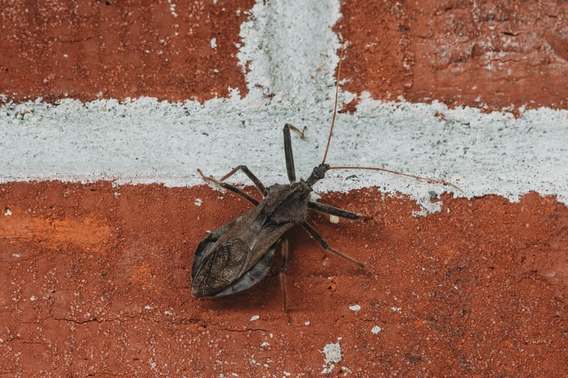 |
| Image credit: Steven Van Elk |
Annual human death cause: About 12,000
Even the name of this bug clearly shows that it is deadly and it is common for this bug to bite people besides their lips, giving them the other name, kissing bug. They mainly live in Arizona, California, Texas, and New Mexico, but also in the lower two-thirds of the United States and other parts of the world.
This bug transfers a parasite known as Trypanosoma cruzi which causes Chagas disease also referred to as American trypanosomiasis. About 6 to 7 million people have been infected by this disease around the globe.
About 300,000 people are living with the symptoms in the United States alone. People infected with the disease can suddenly die, can experience a heart attack and stroke. All this makes this bug among the most dangerous animals in the world.
6. Dogs
Annual human death caused: Above 30,000
Dogs are friendly and loyal but they can be deadly as it is the sixth most dangerous animals in the world in 2025. In the United States alone, about 4.5 million dog bites happen annually.
Most victims of dog bites and attacks are children, the elderly, and postal service attendants. Hundreds of people died of dog attacks each year from dangerous breeds of dogs. You can read more about that here. More than dogs’ biting attacks is rabies infection.
Dogs are the leading cause of rabies mortality in humans, accounting for up to 99 percent of every rabies infection. Yearly, tens of thousands of people die as a result of infection, mostly in Africa and Asia. Thankfully, rabies is an illness that can be prevented with a vaccine.
The most cost-effective technique
for avoiding rabies in humans is to vaccinate dogs. Dog vaccination minimizes
the number of people who die from rabies caused by dogs, as well as the
requirement for PEP as part of dog bite care provision.
5. Tapeworm
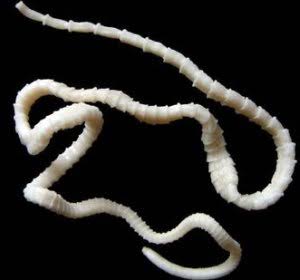 |
| Adult tapeworms can grow to be more than 80 feet (25 meters) long and can live in a host for up to 30 years. Image credit: Thinglink.com |
Annual human death cause: 50,000
Tapeworm also called flatworm is another most dangerous that kills thousands of people yearly. These parasites affect almost 50 million people around the world. Taeniasis is an infection of the digestive tract caused by adult tapeworms.
People can get the infection from eating the raw or undercooked meat. For example, pork, carry Taenia solium while beef generally carries the tapeworm Taenia saginata. The tapeworm's proglottids develop and become packed with eggs.
Eggs are discharged in the feces after proglottids separate. The eggs can survive for months and even years in the surroundings. If cattle and pigs eat vegetation carrying the eggs, they get infected.
Most sufferers are unaware of the infection until they notice proglottids (tapeworm segments) in their feces or moving Taenia saginata roglottids coming out from the anus.
Infected individuals may experience weight loss, weakness, loss or excessive appetite, digestive issues, and abdominal pain. Infected people can spread Taeniasis solium eggs to others, usually through food handling.
If you suspect
you have been infected, please do not handle food until your healthcare
practitioner tells you it's safe. Infected people can avoid infection in
animals by ensuring that feces do not contaminate animal food or grazing
places.
See also:
4. Venomous Snakes
Annual human death caused: Around 81,000 to 138,000
Though the actual number of individuals bitten by snakes is unclear, it is believed that 5.4 million people are bitten each year, including about 2.7 million envenomings. Absolutely, no one can disregard snakes being among the world's dangerous animals in 2025.
Bites from snakes can result in paralysis, which can make victims experience difficulty in breathing, bleeding disorders, which can result in a deadly hemorrhage, irreversible kidney failure, and tissue damage, which can lead to permanent impairment and limb amputation, and of course death.
The most vulnerable are farm laborers and children. Owing to their lesser body mass, children often experience more severe impacts compared to adults.
Another reason people need to guide against venomous snakes is this, numerous companies have stopped producing antivenom due to poor demand, and the cost of various antivenom medicines has skyrocketed in the last twenty years, making treatment expensive for the vast majority of those who require it.
3. Freshwater snail
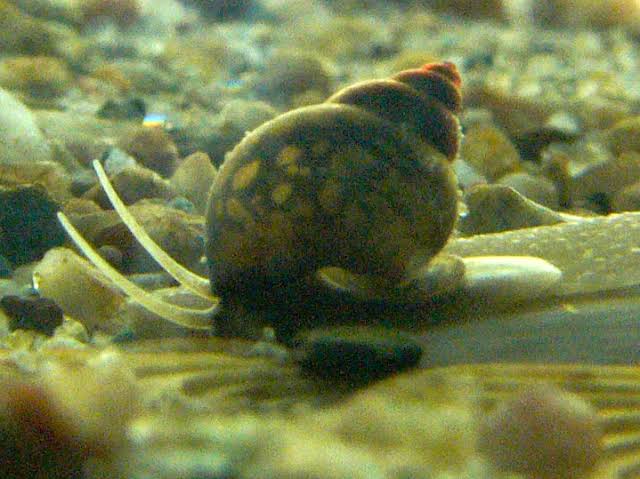 |
| Image credit: Michal Maňas / Wikimedia Commons |
Annual human death cause: 200,000
Schistosomiasis is a parasite disease spread by freshwater snails that affect about 251 million people worldwide, predominantly in South America, Africa and Asia, Africa.
Susanne Sokolow, a disease ecologist at Stanford University's Hopkins Marine Station, describes it as "one of the world's most life-threatening parasites." Certainly, these snails are among .
It is contracted by simply wading, swimming, or otherwise entering the water, and the parasites escape the snails into the water and seek other living things to attach to, at times humans may be victims.
They can pierce human skin, move through the body system, and eventually wind up in blood vessels, in which they can live for years, if not decades. The eggs, not the worms, are the ones that cause sickness in humans.
And those eggs have sharp barbs since they must eventually exit the human body
and return to the ocean, where they must locate snails in order to finish their
reproduction cycle. As a result, those eggs can lodge in various tissues,
causing serious symptoms varying from anemia to drowsiness to cancer.
2. Tsetse Fly
 |
| Image credit: Alan R Walker / Wikimedia Commons |
Annual human death cause: 50,000 to 500,000
Tsetse flies transmit Trypanosoma brucei, a microscopic parasite. As a result, this fly is the second.
West African trypanosomiasis and East African trypanosomiasis are the two types of African trypanosomiasis, which are named after the African regions where they were first discovered.
The West African species of the parasite affects mainly humans while the East type affects cattle and other wild animals. This parasite causes sleeping sickness in humans. Meningoencephalitis is the infection caused by this parasite that leads to unconsciousness or death, thus the name sleeping sickness.
About 60–70 million persons in 36 Sub-Saharan African nations are thought to be at risk of this infection. People can become infected again and again after the initial time.
The infections can also be transmitted from mother to child, through the blood, and through sexual activity, which has all been reported, yet their occurrence is uncommon. Joint and muscle pain, headache, and Fever are the common early signs.
When the parasite penetrates the blood-brain barrier and enters the
central nervous system, it can cause mental impairment, convulsions, and
difficulties walking. If left untreated, the infection will develop, and death
will follow within months to years.
1. Mosquito
 |
| Image credit: Wolfgang Hassel Mann / Unsplash |
Annual human death reported: Around 1 million
In the majority of places around the world except for a few places, mosquitoes are parts of everyday lives. We have learned to accept mosquitoes as a part of life and consider them as a minor annoyance.
Sadly, most people are unaware that the situation is far more terrible. Mosquitoes are the world's deadliest animals in 2025. It seems unbelievable that these small, noisy creatures could cause such havoc, they can.
It is the 1st among the most dangerous animals in the world. These parasitic flies are capable of carrying and transmitting infections in humans. Mosquito bites are, for the most part, just an itchy irritation that should go completely on its own after 24 hours.
People with lower immunity, on the other hand, are increasingly subjected to life-threatening illnesses that can put their lives at risk.
Hemorrhagic fever, Dengue fever, Zika infection, Malaria, and Chikungunya and among others are among the most serious mosquito-borne illness. In 2020, malaria alone causes the death of about 627,000 people.
What are your thought about the most dangerous animals in
the world in 2025? Let us hear from you in the comments section below (Post a comment).
Please share this article and follow us on our social media handles or you can
subscribe to our mailing lists for new updates. Thanks for reading!




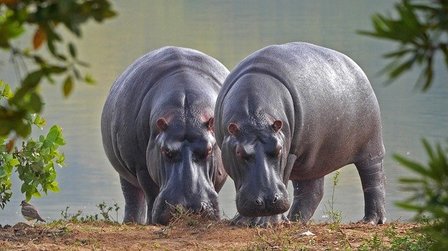

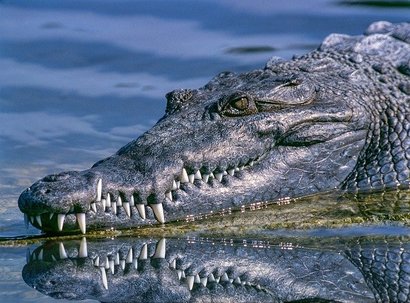


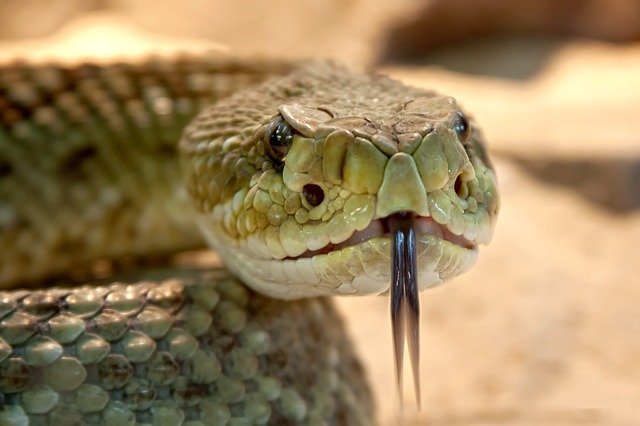
The box jellyfish is the most dangerous animal for me.
ReplyDeleteVery dangerous!
DeletePost a Comment